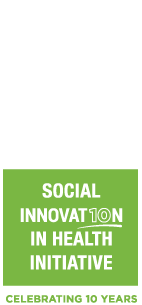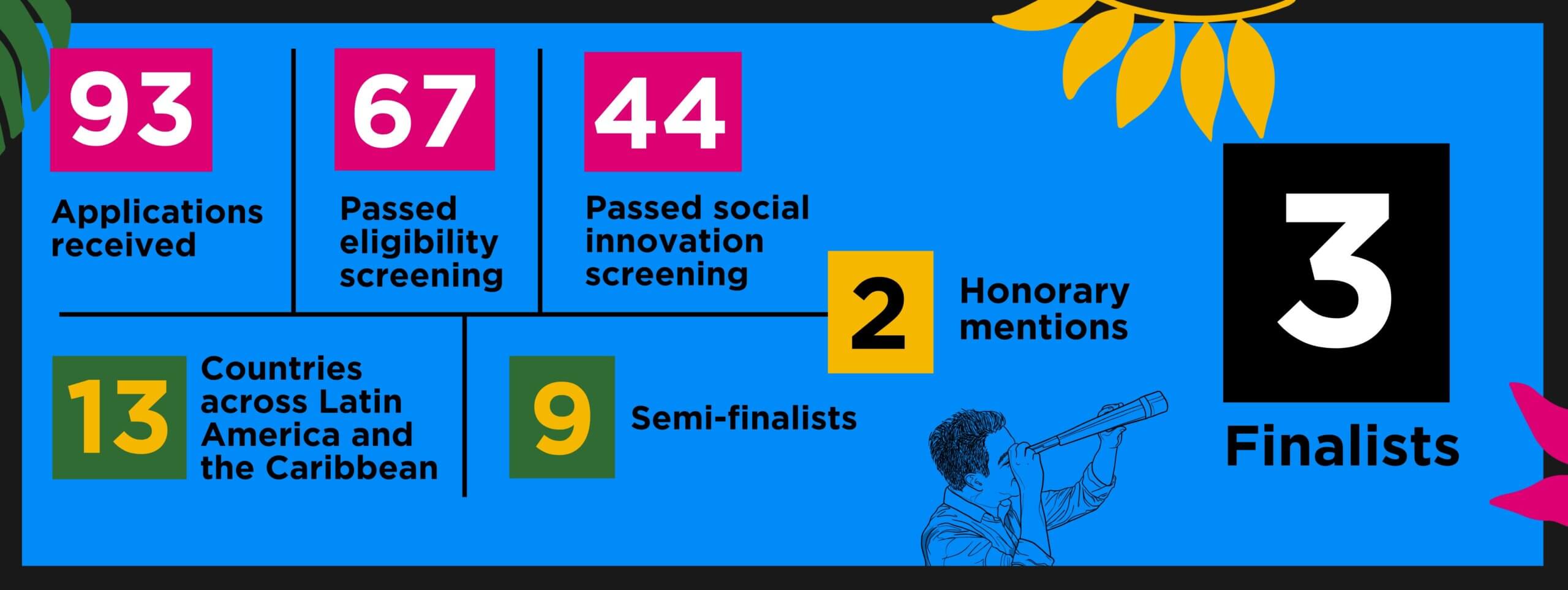OUR 3 FINALISTS!
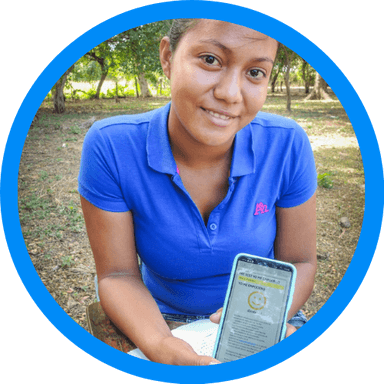
Jovensalud.net free platform for adolescents
Costa Rica
Jovensalud.net is an online platform and App of TeenSmart International aimed at adolescents and young people from 10 to 24 years old. It has information and accompaniment in prevention of risk behaviors and health promotion 24/7 from phones and computers. It began in 2010. It addresses the social determinants of the health of this large population in Latin America, whose needs are not always understood and addressed by the health system. This social innovation focuses on how adolescents and youth with access to information, accompaniment and life skills can develop self-leadership, healthy behaviors and the internal motivations that will position them on a path to success in school, work, and life.
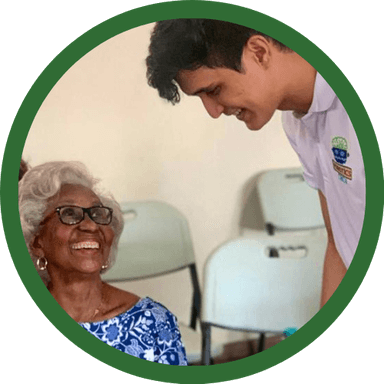
E-Silver
Panama
E-Silver adopts a silver economy perspective as a tool for inclusion and equity, focusing on the needs and demands of older adults. The Latin America and Caribbean region is facing the pressing challenge of an accelerating aging population. E-Silver implements a community-based approach to develop sustainable solutions, integrating digital literacy and social inclusion as enablers to access digital health and cognitive stimulation services, thus improving the quality of life and active participation of older adults. Inter-generational collaboration with young people from universities strengthens the connection between different generations and enriches the proposed solutions to identified problems such as financial and food security.
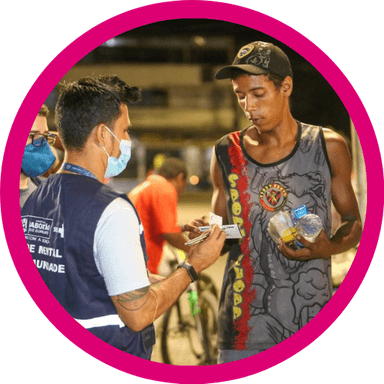
Every artist should be where the people are – Extramural vaccination strategy for the homeless population
Brazil
Within the framework of the pandemic, the health department of the municipality of Jaboatão (Brazil) developed a strategy to ensure the immunization of vulnerable populations, particularly homeless individuals, people who abuse psychoactive substances, and sex workers. The strategy involves a multidisciplinary and intersectoral team (comprising psychologists, nurses, healthcare and social workers, the Department of Health and the Department of Social Assistance, among others) who, along with volunteers from social movements and the homeless individuals themselves, conduct mapping activities, engage in qualified listening, and provide services at strategic and uncommon locations and hours (4 pm – 4 am), where this vulnerable population can more easily access them. Currently, the strategy has been expanding, focusing on comprehensive health promotion and providing services beyond vaccination, such as registering with the federal government’s information system and establishing connections with other sectors of the municipal’s administration (Education, entrepreneurship, etc.).
OUR HONORARY MENTIONS
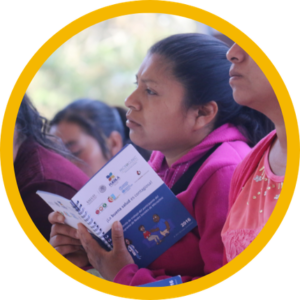
Mexico Microclinic Social Network Program
Mexico
Microclinic International uses social and epidemiological research to address the prevention and control of NCDs in resource-limited settings. The Microclinic International model uses the power of social networks to improve diabetes prevention and control by empowering people to make sustainable changes in their lifestyle and their own health and that of their network, so that participants take responsibility, learning strategies to achieve their goals and maintain their wellbeing.
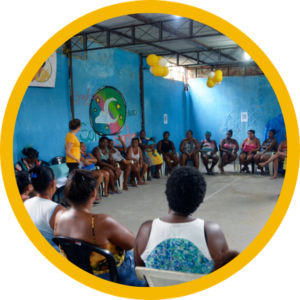
Ana Autoestima
Brazil
Ana Autoestima is a virtual character that offers women living in the favelas of Rio de Janeiro (and potentially other marginalized communities throughout Brazil) access to contextually-relevant information on health, sexual and reproductive rights and sexuality via WhatsApp. The initiative stems from recognizing the intersection of structural poverty, sexism and racism that often affect this population, in vulnerable conditions, when accessing sexual and reproductive health services. The users that belong to Ana Autoestima are co-creators of the information that is disseminated, since their reactions, stories and opinions on the contents and formats of the day to day are continuously collected and integrated into new strategies and services according to the experience of the audience.
AN EXPRESSION OF GRATITUDE
On behalf of the SIHI LAC secretariat, we want to thank each project which participated in the 2023 call. It’s so wonderful to learn about how your work is making healthcare more fair and just for communities and we would like to commend each of these projects. We also want to extend our gratitude to everyone who supported this 2023 call.
Thank you to our independent expert panel for your hard work in reviewing the applications:
- Irene Arias Hofman
- Joanne Klevens
- Walter H. Curioso
- Perla Simons Morales
- Luis Tejerina
- Damian K. Francis
As well as a thank you to our call dissemination partners who helped us raise awareness around the call and helped us receive applications from all across Latin America.

A FINAL WORD OF ENCOURAGEMENT
We would like to encourage you to please keep in contact with us and apply again for our next call.
If you have any questions or comments, please contact:
Valentina Becerra – Sihilachub@cideim.org.co

LAERN MORE ABOUT THE 2023 CALL
Communities across Latin America and the Caribbean deserve a fair and just opportunity for health.
Often structural, social, environmental, commercial or behavioral circumstances hinder people from becoming their healthiest selves.
The social innovation process creates strategies to address these circumstances achieving fair and just health for all.
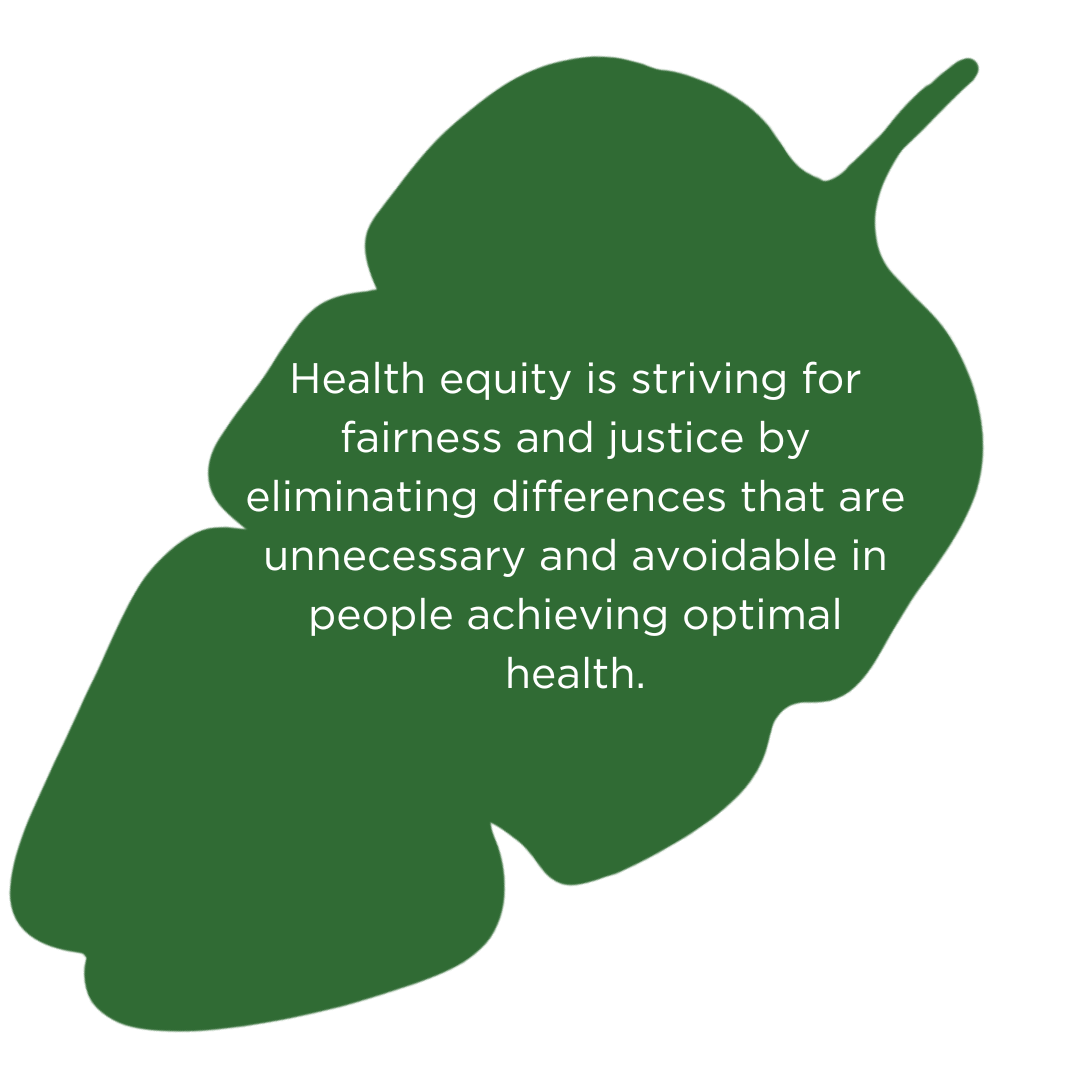
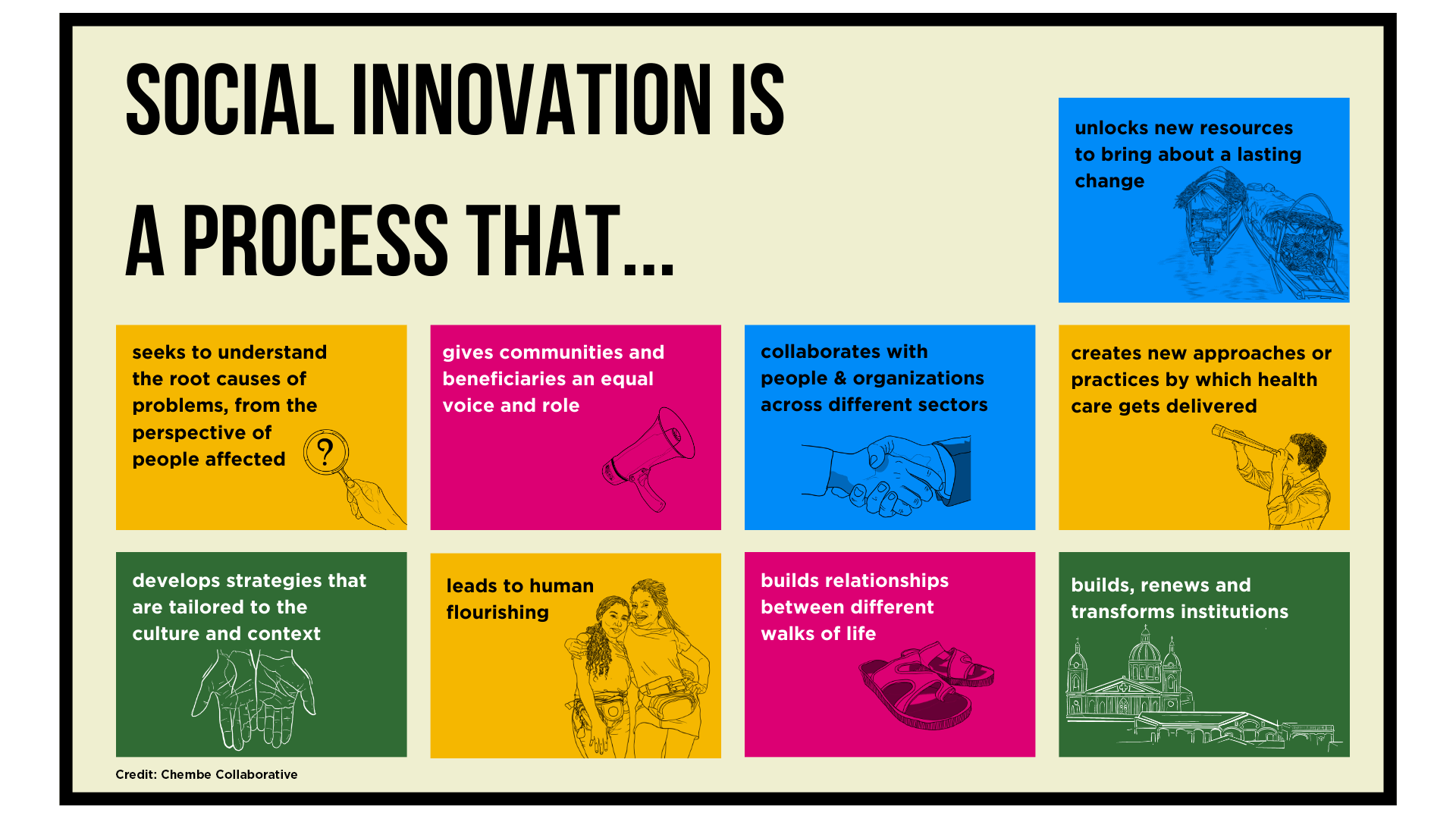
We are searching for social innovation strategies that have made health care fair and just for communities in Latin America and the Caribbean.
Do you know of any?
WHAT ARE WE LOOKING FOR?
Whether you are a public health practitioner, a health worker, a community member, an entrepreneur, or a student, working in a private, public or not-for-profit organization, we want to learn from your social innovation strategies!
Your social innovation strategy can be part of a project, a solution, an intervention, an organization or a technology.
Health Equity
A social innovation strategy that has made a demonstrable impact in making healthcare more fair and just for a specific community, within a specific setting.
Social innovation strategies*
The innovation can include any of the following strategies:
Purpose – the innovation frames a new vision for how a critical health challenge can be addressed.
Power – the innovation challenges traditional power dynamics in health, who is involved and who participates.
Practices – the innovation creates new processes or practices by which healthcare gets delivered.
Relationships – the innovation builds relationships and collaborations across levels, sectors, and hierarchies, within and outside the health system.
Resource Flows – the innovation unlocks resources or changes how resources are allocated.
Countries of implementation
Any country in Latin America and the Caribbean
Duration of implementation
Active for more than 1 year and solution implemented for at least 6-months by 1 July 2023
Timely completion of application form
Applications will only be considered where the application form has been completed in its entirety and submitted before the due date.
*Reference: Winhall, J & Leadbeater (2020). Building Better Systems-A Green Paper on System Innovation.
TIMELINE & PROCESS


THE OPPORTUNITY
You can benefit in several ways:
Recognition by PAHO-WHO: - Finalists will receive recognition by PAHO-WHO representatives.
Network of Innovators - Finalists will become part a regional network for social innovation (ALACISS).
Visibility - Your work will be shared by PAHO and featured on the SIHI website.
REVIEW CRITERIA
Each solution will be reviewed by at least two of the experts on the selection panel according to the following criteria.
Appropriateness to need and context and culture
The strategy addresses the challenge experienced by a specific community, in a contextually appropriate and culturally sensitive way.
Degree of creativity
The strategy provides an alternative, new or creative approach to the status quo.
Health Equity
The strategy has the potential to enhance equity and address the determinants of health, especially for the most excluded or marginalized.
Co-creation
The strategy is created, implemented or monitored with the participation of the community, local actors or local leaders.
Collaborative relationships
The strategy is informed by or implemented through collaboration with people or organizations from other disciples or sectors.
Affordability
The strategy is affordable to those excluded in the local context and presents a more cost-effective alternative as compared to the status quo.
Effectiveness
The strategy has the potential to enhance health outcomes and / or the capacity of the local population.
Scalability
The strategy can be replicated in communities with a similar need and/ or can be integrated into the health system.
Sustainability
The strategy has the possibility to be sustained and become lasting.
Systems-change potential
The strategy has the potential to positively disrupt the health system and strengthen it.
HOW TO APPLY
There are several ways you can apply:
COMPLETE THE ONLINE FORM
Complete the application form online
DOWNLOAD THE FORM
Download the application form and email it to us
Only proposals submitted using the form on the dates specified in this call will be considered.
CALL REVIEW PANELISTS:
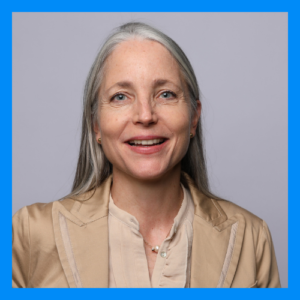
Irene Arias Hofman
Irene Arias Hofman is the CEO of IDB Lab, the innovation laboratory of the Inter-American Development Bank Group, the leading source of development finance for Latin America and the Caribbean. The purpose of IDB Lab is to drive innovation for inclusion by supporting early-stage entrepreneurial solutions capable of transforming the lives of vulnerable populations.
Previously, Irene worked for 20 years at the IFC, the private sector arm of the World Bank Group, where she managed the Financial Institutions Group and also the LAC region with its 16-billion-dollar portfolio. Her focus has been on innovation and technology, venture capital, and organizational development.
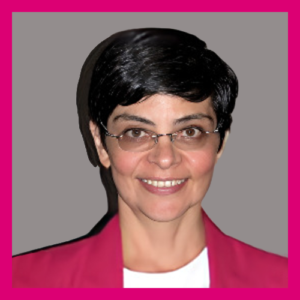
Joanne Klevens
Joanne Klevens, MD, MPH, PhD has worked in public health for almost 40 years, in violence prevention for almost 30 years, and recently retired from the Centers for Disease Control and Prevention (CDC) after almost 20 years. At the CDC, she conducted or collaborated in research on the effectiveness of interventions to prevent child maltreatment, partner violence, and youth violence.
Before joining the CDC, Dr. Klevens worked as a researcher and consultant in violence prevention with the cities of Bogotá and Medellín in Colombia, South America. Her research in Colombia focused on the etiology and prevention of child maltreatment and youth violence.
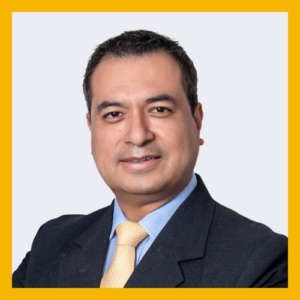
Dr. Walter H. Curioso
Dr. Walter H. Curioso, PhD, MD, MPH holds a Ph.D. in Biomedical Informatics from the University of Washington (UW), Seattle, United States; as well as an M.P.H. from UW; and received his M.D. from Universidad Peruana Cayetano Heredia in Peru.
Over the past 20 years, Dr. Curioso has held numerous leadership positions at the national and international levels, encompassing both the public and private sectors. He was elected Member of the World Health Organization Digital Health Roster of Experts.
In academia, he is Affiliate Associate Professor in the Department of Biomedical Informatics and Medical Education in the School of Medicine at the University of Washington, Seattle, Washington, USA. Dr. Curioso is currently the Vice Provost for Research at Universidad Continental in Peru.
Dr. Curioso´s research interests are mainly focused on strengthening health information systems, mobile health, and global health informatics. He has led the planning, implementation, monitoring, and evaluation of national-level projects pertaining to the utilization and implementation of information and communication technologies in the fields of health, education, and social development.
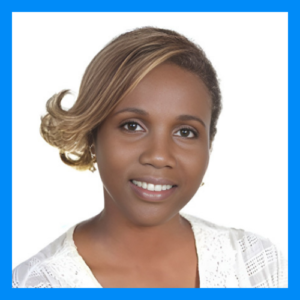
Perla Simons Morales
Perla is the Coordinator of the Scientific Research Unit and a lecturer at the Faculty of Medical Sciences, Universidad Nacional Autónoma de Honduras. Perla is also a registered nurse and researcher who promotes scientific research as a tool for change to improve the health condition of the population. She holds a Master’s in Public Health.
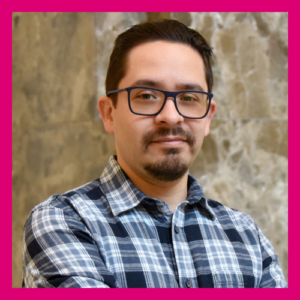
Luis Tejerina
Luis Tejerina is a Lead Specialist in the IDB’s Social Protection and Health Division, where he works on digital transformation projects in the social sector, and on tools to promote the most efficient and effective use of technology.
He has a Masters in Economics from the University of Maryland.
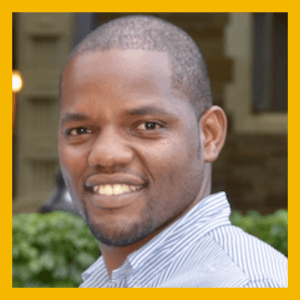
Damian K. Francis
Damian K. Francis is a Nutritionist and Epidemiologist trained at the Caribbean Institute for Health Research, University of the West Indies, Jamaica. Dr. Francis is the Director of the Center for Health & Social Issues at Georgia College & State University.
He is an Emerging Leader of the Americas Programme (ELAP) scholar, completing a research fellowship in knowledge synthesis and knowledge translation at the University of Ottawa. Dr. Francis is the founder of the Cochrane Caribbean and currently serves as adjunct faculty for the World Health Organization (WHO)/Cochrane/Cornell Summer Institute for systematic reviews in nutrition for global policymaking. He serves both the Pan American Health Organization and as a member of the Essential Medicine List expert panel. Dr. Francis is an Assistant Editor for the Campbell Collaboration Nutrition Sub-group of the International Development Coordinating Group.
He enjoys teaching epidemiology, translational research methods and mentoring students in research. Dr. Francis has a track record of excellence in research publication which has focused on the epidemiology of chronic non-communicable diseases among people of Afro-Caribbean heritage with an emphasis on health equity, systematic reviews of interventions, and the food environment as a risk factor for diseases.


